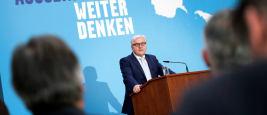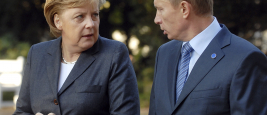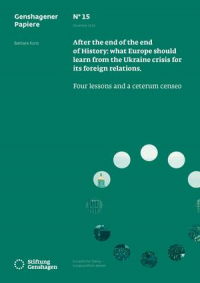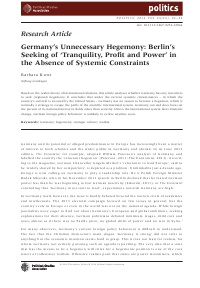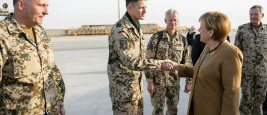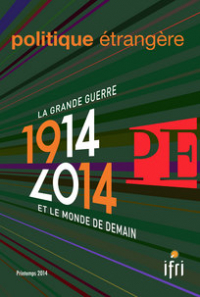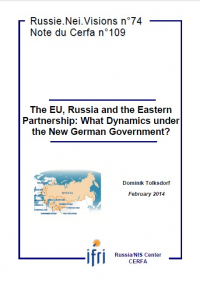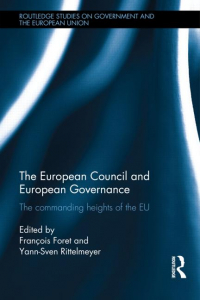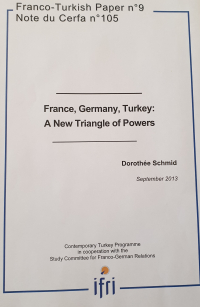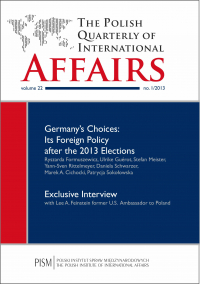German foreign policy is today confronted with a number of fundamental challenges. The country has become larger and has again become strong economically and must no longer content itself with its former role as France’s political junior partner in Europe or the United States’ junior partner...

Germany (Cerfa)
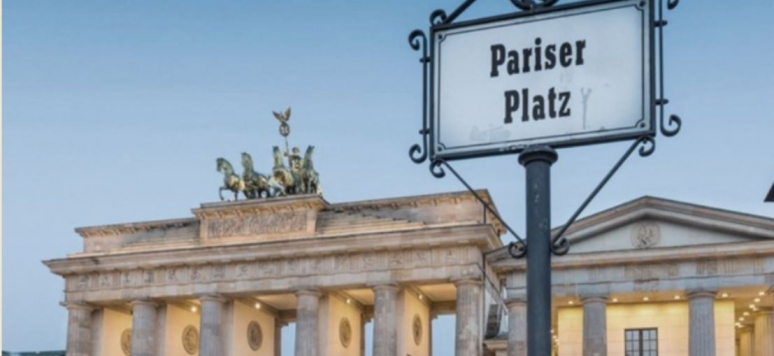
The Study Committee on Franco-German Relations (Cerfa) was founded by an intergovernmental treaty between the Federal Republic of Germany and the French Republic in 1954. It has analyzed relations between the two countries for over 60 years. The Cerfa engages in a wide range of activities. It promotes the Franco-German debate and policy-oriented research through conferences and seminars that bring together experts, policy-makers, decision-makers and civil society representatives of both countries.
The Cerfa publishes regularly books reflecting on the current state of Franco-German relations and two research note series – Notes du Cerfa and Visions franco-allemandes – that target primarily French decision-makers, with the aim of elucidating political, economic and social evolutions in contemporary Germany, and closely following current developments in Franco-German relations.
The Cerfa maintains close relations with the network of German foundations and think-tanks, including the Konrad Adenauer Foundation, Friedrich Ebert Foundation, Heinrich Böll Foundation, German Council on Foreign Relations (DGAP), Genshagen Foundation, French-German Institute (DFI), and German Institute for International and Security Affairs (SWP).
Through its successive interactive and ad hoc cooperation programs, the Cerfa promotes the emergence of a new Franco-German generation:
- In the year 2021, the Cerfa started a Program on Multilateralism with the Konrad Adenauer Foundation in Paris. This program aims at creating a Franco-German network bringing together young professionals interested in the topic of multilateralism in the context of their work. It consists in working sessions based on briefings and workshops with selected experts and practitioners covering a broad range of issues relating to multilateralism, such as international trade, health, human rights and migration, non-proliferation and disarmament.
Previous initiatives:
- The Franco-German Future Dialogue co-organized by the Cerfa together with the DGAP and with the support of the Bosch Foundation aimed at creating a new Franco-German generation by developing exchanges and debates between French and German young professionals and PhD students.
- The Daniel Vernet Group (formerly the Franco-German group of reflection) had been founded in the Fall of the year 2014 at the initiative of the Genshagen Foundation.
Secretary General of the Study Committee on Franco-German Relations (Cerfa)
...Research Fellow, Study Committee on Franco-German Relations (Cerfa)
...Research Fellow, Study Committee on Franco-German Relations (Cerfa)
...Assistante
Counselor on Franco-German relations at Ifri
...In 2014, Germany’s relations with Russia markedly deteriorated. The decline was precipitous but it did not occur suddenly. It began some time before Moscow’s annexation of Crimea in March 2014 and the Kremlin’s support for separatism and thinly concealed military intervention in eastern...
This paper intends to take a step back from current developments in Ukraine in order to analyze the lessons Europeans ought to draw from the crisis that caught many by surprise. Whether the Ukrainian crisis really turns out to be a »game changer« in a structural sense remains to be seen,...
Based on the realist theory of international relations, this article analyses whether Germany has any incentives to seek (regional) hegemony. It concludes that under the current systemic circumstances – in which the country's survival is ensured by the United States – Germany has no reason to...
The speeches made by several German leaders at the Munich Security Conference in early 2014, emphasized that Germany needs to be ready for greater international commitment, and without a priori excluding military instruments.
Germany’s responsibility in the two global conflicts reflects, among other things, the German military’s desire to free itself from political control and the depth to which the Wehrmacht was immersed into Nazi ideology and a Nazi state whose orders it never really contested.
The Eastern Partnership summit in Vilnius in November 2013 demonstrated that the European Union’s policy toward its eastern neighbors has developed into a highly contentious issue between the EU and Russia.
Relations between Germany, France and Turkey have been strictly bilateral for a long time, with varying intensity, styles and areas of cooperation. The European perspective that is now part of these relations has introduced a three-way dynamic.
Due not only to its importance but also to the place it leaves to symbolic politics, the Franco-German relationship is often described through emotions and in a Manichaean way, alternating between a description of two close friends and a nearly divorced couple. What is the current state of the...








